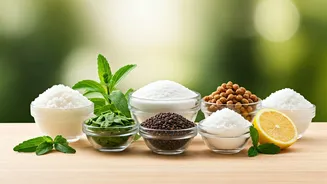Stevia: The Sweet Leaf
Stevia is a natural sweetener derived from the Stevia rebaudiana plant. It is widely recognized for its intense sweetness, which is significantly higher
than that of refined sugar. However, the critical benefit is that Stevia doesn't affect blood sugar levels, making it a great option for people with diabetes. The plant has been used for centuries, and its extracts are available in various forms, including liquid, powdered, and granulated. It is also calorie-free. This characteristic further helps with weight management, providing an added advantage for individuals with diabetes, where maintaining a healthy weight is often essential. Stevia can be used in beverages, baked goods, and other foods to provide sweetness without raising blood glucose levels.
Monk Fruit Magic
Monk fruit sweetener, extracted from the monk fruit, is another popular choice. This fruit originates from Southeast Asia and is naturally sweet without the use of artificial additives. Monk fruit is a zero-calorie, zero-carb sweetener, ensuring it has no impact on blood sugar levels. Its sweetness comes from compounds called mogrosides, which are metabolized differently by the body compared to sugar. This quality makes monk fruit suitable for people with diabetes or those looking to control their sugar intake. The taste profile is often described as clean and pleasant, making it a versatile alternative in many recipes. Monk fruit can be used in a wide range of applications, from sweetening coffee and tea to baking and cooking, providing a healthy alternative to traditional sweeteners.
Erythritol's Appeal
Erythritol is a sugar alcohol that occurs naturally in some fruits and is also produced through fermentation. This sweetener has minimal calories and does not significantly affect blood sugar levels, which makes it an attractive choice for those with diabetes. Its glycemic index is very low, ensuring it does not lead to sudden spikes in blood sugar. Erythritol has a clean taste, with approximately 60–70% of the sweetness of sugar. It can be used in various recipes, from drinks to desserts, and generally has good digestive tolerance. Moreover, Erythritol is often found in combination with other sweeteners to improve flavor and texture, further increasing its versatility in both commercial and home food preparation.
Xylitol for Sweetness
Xylitol is a sugar alcohol commonly found in many fruits and vegetables. It has a sweetness similar to table sugar but with a lower glycemic index, impacting blood sugar levels less significantly. It provides a unique advantage in that it can help to prevent dental cavities by reducing the growth of bacteria in the mouth. Xylitol's ability to be absorbed slowly also contributes to its lower impact on blood glucose levels. However, it's worth noting that consuming large amounts of xylitol can have a laxative effect, and it’s toxic to dogs. Xylitol is frequently used in sugar-free gum, toothpaste, and various other food products to offer a sweet taste without the negative effects of sugar.
Maple Syrup's Place
Maple syrup, a natural sweetener, comes from the sap of maple trees. It contains trace minerals and antioxidants, offering nutritional benefits alongside sweetness. However, it still contains carbohydrates and can impact blood sugar levels, though it may be less severe than refined sugar. It has a slightly lower glycemic index compared to table sugar. People with diabetes need to moderate the intake of maple syrup and monitor their blood sugar levels to manage its effects. Maple syrup can be a flavorful addition to breakfast foods, baked goods, and other dishes, providing a delicious taste along with some additional nutrients. When choosing maple syrup, opt for pure maple syrup rather than syrup that contains high fructose corn syrup.
Honey's Sweetness
Honey is a natural sweetener known for its distinctive taste and various health benefits, including antioxidant properties. It contains vitamins, minerals, and enzymes. Honey's impact on blood sugar levels can vary depending on the type of honey and the individual's metabolism. It has a glycemic index that's generally higher than sugar. People with diabetes should consume honey in moderation and carefully monitor blood sugar levels. Choosing raw, unprocessed honey can provide some extra health benefits. Honey can be used in moderation as a substitute for sugar in recipes and drinks.
Coconut Sugar Choices
Coconut sugar is a natural sweetener obtained from the sap of the coconut palm tree. It contains some nutrients like iron, zinc, calcium, and potassium. It has a lower glycemic index than regular table sugar. This means it may cause a less significant spike in blood sugar levels. Coconut sugar still contains calories and carbohydrates, so people with diabetes need to control their intake. Coconut sugar has a subtle caramel-like flavor, and it can be used in a variety of culinary applications. It provides a less processed alternative to refined sugar but should still be used in moderation within a balanced diet.

















